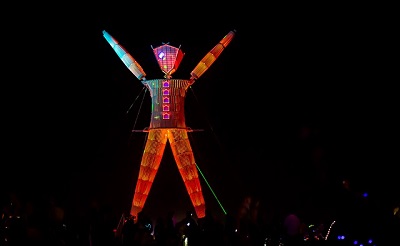by Alice Temnick
What does an eight day participatory city with nothing for sale look like? In this episode, Marian Goodell, CEO of the Burning Man Project, and EconTalk host and Russ Roberts discuss various aspects of the annual phenomenon event that takes place in the Nevada desert and the global reach of Burning Man’s influence.
1. What is the mix of planning and emergent order that enables the annual production of Burning Man? Could an eight day “city” emerge without a central plan? How necessary is cultural acceptance of the rules of the game?
2. Rules have increased over time for the city experience of Burning Man. Is this a result of population growth which led to the holding back of tickets for volunteers/artist groups? Is it inevitable in any growth-oriented endeavor over time?
3. Goodell emphasizes the principle of immediacy and the need for human connection that draws global attention toward Burning Man Principles. What concerns emerge when the merits of decommodification and gifting are compared (or favored?) to commercial transactions as a means of exchange?
4. To what extent can or do these ten principles work within the constraints of a greater body of rules and laws (such as within the U.S.?)
5. Have you ever attended Burning Man? If so, what was your experience? Has this episode influenced your desire to participate? Why or why not?
Alice Temnick teaches Economics at the United Nations International School in New York City. She is an Economics examiner for the International Baccalaureate, teaches for the Foundation for Teaching Economics and Oxford Studies Courses and is a long-time participant in Liberty Fund Conferences.


READER COMMENTS
Andy O
Feb 1 2018 at 5:48pm
Call it gifting if you want… but it’s a transaction none the less IMO. I don’t see it different than giving a homeless person something (lets say a new blanket). Adam Smith is at work there for sure… loved and lovely. I work and live in silicon valley and many of my friends have attended… and the reality seems to be different that what was described in the podcast… as those attendees said that there’s definitely bartering and networking going on in the desert.
Dr Golabki
Feb 3 2018 at 6:32pm
1. What is the mix of planning and emergent order that enables the annual production of Burning Man? Could an eight day “city” emerge without a central plan? How necessary is cultural acceptance of the rules of the game?
At least some central planning is probably necessary (see #2 below), but culture is key also. If Burning Man was more accessible you would get more people that were not really bought into to culture of the event, and I think there’s probably a tipping point.
2. Rules have increased over time for the city experience of Burning Man. Is this a result of population growth which led to the holding back of tickets for volunteers/artist groups? Is it inevitable in any growth-oriented endeavor over time?
– Yes, it’s inevitable. The number of well functioning groups with tens of thousands of people and zero rules is about zero in human history.
3. Goodell emphasizes the principle of immediacy and the need for human connection that draws global attention toward Burning Man Principles. What concerns emerge when the merits of decommodification and gifting are compared (or favored?) to commercial transactions as a means of exchange?
– I think Russ made the right analogy to family / friends / close community. Obviously those are important human interactions that we probably have less now than we would have, say… 500 year ago. We where social evolution is much faster than biological evolution.
4. To what extent can or do these ten principles work within the constraints of a greater body of rules and laws (such as within the U.S.?)
– I think these principles are pretty uninteresting. Seems like standard corpo nonsense. Every big company has a list of “principles” or something similar. They are always broad enough to mean approximately nothing even if they occationally are the subject of nonsensical HBR articles.
Greg Worrel
Feb 5 2018 at 1:47pm
Listening to this made me less likely to attend Burning Man than I might have been. Not knowing much about it, I always imagined it to be more of an example of anarchy than it is. While it sounds like some of the rules and regulations (permits, applications, fees) are the result of dealing with government organizations, it is not nearly as free-wheeling as I imagined it to be. Russ seemed to have the same idea as he tried to draw out examples of emergent order.
To Andy’s point above about bartering and networking going on: How could it not? Prohibitions do not eliminate normal human interactions but merely drive them underground.
Wolf D
Feb 7 2018 at 2:35pm
Great interview as usual.
I wonder to what extent the monetary/exchange-based economy which Burning Man rejects in fact facilitates and underpins the festival? Everything brought to Burning Man, whether consumed on site or gifted, must have been acquired in the “normal” economy. Could Burning Man exist on its own outside the market economy or is it paradoxically dependent on the very model it criticizes?
Comments are closed.